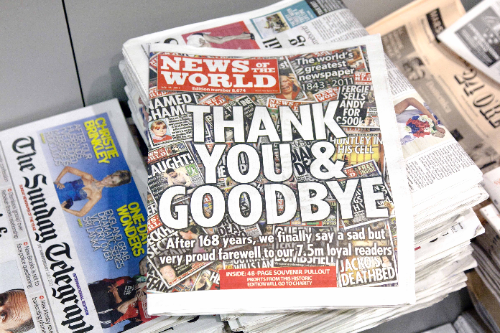Phone hacking scandal and Leveson Inquiry
In 2011, it emerged that the News of the World newspaper had hacked the phones of celebrities, politicians and members of the public. It was arguably the most famous invasion of privacy in the UK – even affecting members of the Royal Family.

Phone hacking was a technique used to access people’s voicemail accounts, to illicitly listen, and sometimes record, the private messages. Perhaps the most shocking cases were those of victims caught up in the scandal who had never sought to be in the public eye. Years of allegations culminated in the revelation that News of the World staff accessed the voicemails of Milly Dowler, a teenager who was abducted and murdered. Firefighter Paul Dadge, who helped survivors outside Edgware Road tube station after the 7/7 bombing, said he had also been contacted by police who were investigating phones being hacked by the press.
The scandal was followed by the Leveson Inquiry, a judicial public inquiry into the culture, practices and ethics of the British press. The Information Commissioner’s Office supported the Inquiry by providing evidence and witness statements.
The ICO had previously submitted two special reports to Parliament on a similar topic. Our investigation found evidence of a widespread and organised undercover market of personal information, supplied by private investigators to various journalists and publications.
Because of the Leveson Inquiry, Parliament tasked the ICO with creating a journalism code of practice to assist the media in using personal information lawfully. The code provides practical guidance on how to comply with data protection law while still enabling journalists to do their job and serve the public interest.